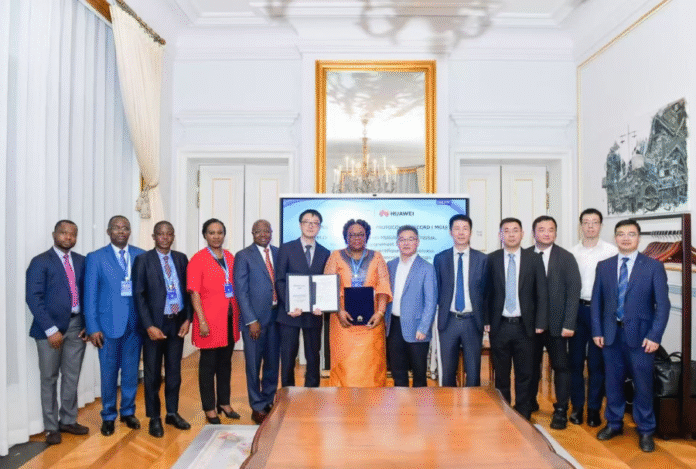Illustrative Image: Huawei Partners with African Nations to Drive Inclusive Education Through AI and Digital Technologies
Image Source & Credit: Techafricanews
Ownership and Usage Policy
At the Global Smart Education Conference 2025, held in Beijing from August 18 to 20, Huawei made a strong commitment to the future of inclusive education in Africa. The event brought together education ministry officials, policymakers, and university representatives from more than 30 African countries, including Egypt, Algeria, Senegal, the Democratic Republic of the Congo (DRC), and Cameroon.
A key highlight was the inaugural African Inclusive Education Forum, where Huawei signed several Memorandums of Understanding (MoUs) and Letters of Intent (LOIs) with African governments and institutions. These agreements aim to deepen cooperation on integrating digital and intelligent technologies into Africa’s education systems, with a focus on building ecosystems that make learning accessible to all.
Breaking Barriers with Technology
Digital and AI-driven innovations are transforming education globally by making learning more personalized, efficient, and adaptive. For Africa—where disparities in infrastructure, resources, and geographical access remain pressing challenges—these technologies hold the potential to level the playing field. Through tools such as smart classrooms, affordable cloud terminals, campus connectivity, and AI-driven digital teachers, Huawei envisions breaking down barriers that prevent learners from disadvantaged regions or backgrounds from accessing quality education.
Ye Ziping, Vice President and Chief Digital Officer of Huawei Northern Africa, emphasized the company’s commitment to “designing targeted inclusive education solutions” tailored to the realities of African countries. By combining technological expertise with local needs, Huawei seeks to ensure equitable access to education and empower every student and teacher.
Building Skills for the Digital Era
The conference underscored that ICT talent development is central to long-term success. Over the past decade, Huawei has collaborated with more than 3,000 universities worldwide, established Huawei ICT Academies, and trained over one million students. These efforts highlight a recognition that the future of education is not just about hardware and connectivity but also about human capacity-building.
Peter Zhang, Vice President of Huawei’s Global Public Sector BU, reiterated that technology must go hand-in-hand with talent cultivation to drive sustainable growth in the education sector. By working with partners, Huawei plans to expand training opportunities and prepare African youth for the digital economy.
Lessons from China’s Experience
China’s own journey in digital education was showcased at the conference by Professor Wu Yonghe, Director of CELTSC under China’s Ministry of Education. He noted that national policies, aligned with local implementation, have enabled AI to be integrated into every stage of the teaching process—from lesson planning and classroom instruction to student assessment. This integration has improved both the quality and inclusivity of education, benefiting millions of students and teachers.
Huawei’s Inclusive Solutions for Africa
Liu Yue, Director of Inclusive Education at Huawei Northern Africa, detailed the company’s end-to-end “device-pipe-cloud-intelligence” approach. By combining hardware, connectivity, and cloud-based solutions, Huawei aims to extend the classroom beyond physical walls, bridging urban-rural divides and enhancing educational equity.
The initiatives include:
-
Smart classrooms equipped with digital tools.
-
Affordable cloud-based terminals to widen access.
-
Campus connectivity solutions to ensure seamless learning.
-
AI-driven platforms that personalize education for students.
By leveraging these tools, Huawei hopes to accelerate Africa’s transition toward digital-intelligent education ecosystems aligned with the UN’s goal of universal access to quality education.
Strengthening Partnerships in Africa
Several significant agreements were signed during the event. In the DRC, Minister Prof. Dr. Sombo Ayanne Safi Mukuna Marie-Thérèse signed an LOI with Huawei to expand digital infrastructure for universities, introduce smart classrooms, and establish a joint innovation lab to nurture local digital talent.
In Senegal, Minister of National Education Moustapha Mamba Guirassy signed an MoU with Huawei and Sonatel to boost digital teaching equipment, infrastructure, and talent development. These partnerships illustrate a growing recognition across African governments that digital transformation in education is essential for future growth.
Toward a Shared Digital Future
The event also allowed African delegates to visit education industry showcases in Beijing, Shenzhen, and Dongguan, where they exchanged experiences with Chinese peers. These interactions highlighted the shared challenges and opportunities of digital education.
Ultimately, Huawei’s pledge reflects a broader vision: technology as a tool of empowerment. By investing in inclusive education, Huawei and its partners seek to build a future where every African learner—regardless of location, background, or resources—can access high-quality education and thrive in the digital era.
















 The African Research (AR) Index is a comprehensive scholarly directory and database focused explicitly on journal publishers that publish and disseminate African research.
The African Research (AR) Index is a comprehensive scholarly directory and database focused explicitly on journal publishers that publish and disseminate African research.

